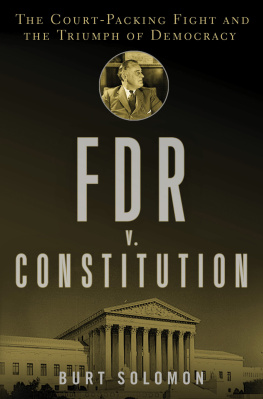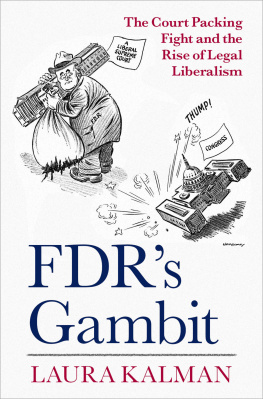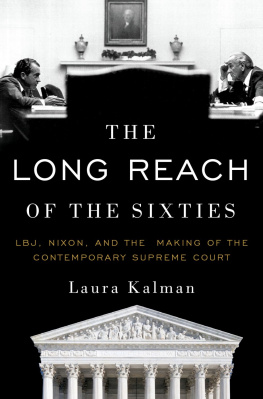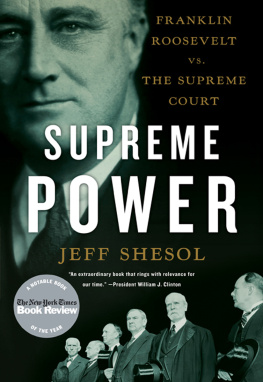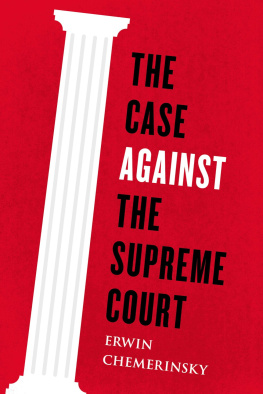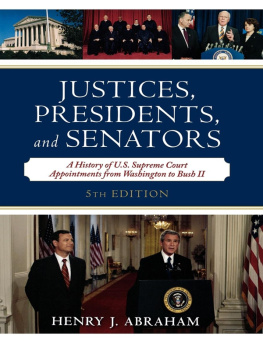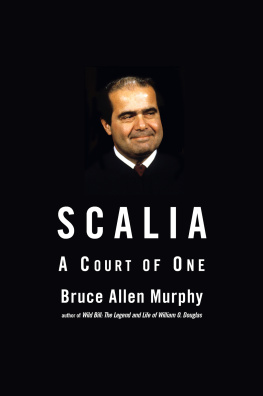FDR v. The Constitution
Copyright 2009 by Burt Solomon
All rights reserved. No part of this book may be used or reproduced in any manner whatsoever without written permission from the publisher except in the case of brief quotations embodied in critical articles or reviews.
For information address Walker & Company, 175 Fifth Avenue, New York, New York 10010.
Published by Walker Publishing Company, Inc., New York
All papers used by Walker & Company are natural, recyclable products made from wood grown in well-managed forests. The manufacturing processes conform to the environmental regulations of the country of origin.
LIBRARY OF CONGRESS CATALOGING-IN-PUBLICATION DATA
Solomon, Burt.
FDR v. the Constitution: the court-packing fight and the triumph of democracy / Burt Solomon.1st U.S. ed.
p. cm.
Includes bibliographical references.
eISBN: 978-0-802-71957-7
1. Roosevelt, Franklin D. (Franklin Delano), 1882-1945. 2. United States. Supreme CourtHistory20th century. 3. JudgesSelection and appointmentUnited StatesHistory20th century. 4. LawPolitical aspectsUnited StatesHtstory20th century. 5. Executive powerUnited StatesHtstory20th century. 6. Separation of powersUnited StatesHistory20th century. 7. United StatesPolitics and government1933-1945. 8. Constitutional historyUnited States. 9. DemocracyUnited StatesHtstory20th century. 10. Political cultureWashington (D. C.)History20th century. I. Title. II. Title:
FDR versus the Constitution.
KF8742.S585 2009
34773'2609dc22
2008033222
Visit Walker & Company's Web site at www.walkerbooks.com
First U.S. edition 2009
1 3 5 7 9 10 8 6 4 2
Typeset by Westchester Book Group
Printed in the United States of America by Quebecor World Fairfield
THE COLD, DRIV ING rain presented the nastiest weather for a presidential inaugural since 1909, when a blizzard had forced William Howard Taft to move his inside. When someone suggested to Franklin Delano Roosevelt that he do the same, on the twentieth of January in 1937, he shot back, "If those people can take it, I can, too." He meant the thousands upon thousands of Americans who had flocked to Washington to celebrate the beginning of his second term in the White House.
The president had ridden to the Capitol in an open car and had willed his nearly useless legs across the roofed platform, leaning on the arm of his eldest son, James. He stood and faced Charles Evans Hughes, the chief justice of the United States; both men were bareheaded in the swirling rain. His family's old Dutch Bible was covered in cellophane, and he placed his hand on top. In repeating the full oath of office, forsaking the traditional response of "I do," he spoke slowly and with emphasis as he swore to "protect and defend the Constitution of the United States."
Then he stepped to the podium, wearing a winged collar, a gray cutaway suit, and an overcoat. His hair was grayer and sparser and his features were heavier than four years before. Gone from his muscular face was any trace of his famously sunny smile. Below, the umbrella-covered crowd had thinned as the spectators sought shelter. At the east front of the Capitol, in a plaza that could hold a hundred thousand, no more than eight thousand onlookers remained, ankle-deep in mud. The few of those who could hear him found it hard to applaud with an umbrella in hand.
"My fellow countrymen ..." This was not the salutation that radio listeners had learned to expect; in his fireside chats he always began, "My friends." Yet there was an unfailing cheerfulness to his tenor, even as the wind whipped across his cheeks.
"This year marks the one hundred and fiftieth anniversary of the constitutional convention which made us a nation ..." The Founding Fathers had designed a means of escaping from the chaos of the Revolution"a strong government, with the powers of united action sufficient then and now to solve problems utterly beyond individual or local action. A century and a half ago they established the federal government in order to promote the general welfare and secure the blessings of liberty to the American people. Today we invoke those same powers of government to achieve the same objective.?"
The weather may have been gloomy, but the nation's outlook was sunnier than it had been four years earlier, when Roosevelt first stood at the east front of the Capitol after the most pitiless four months in the nation's economic history. He had recently spent his reelection campaign telling the public how he had mastered the "economic royalists," the malefactors he had assailed in accepting his party's nomination for a second term, and how the New Deal had salved the Great Depression by supplying farm subsidies, public works jobs, an assurance of collective bargaining, rural electricity, jobless benefits, old-age pensions, a guarantee for frightened bank depositors. More than anything, the New Dealand the man behind it, the thirty-second presidenthad given the citizenry a spirit of hope. "The only thing we have to fear is fear itself," he had famously asserted. Economics, with its graphs and statistics, was an expression of mass psychology, the aggregation of how millions of peopleproducers, transporters, consumersacted and interacted at a moment in time. The economy was something more than a soulless machine; it was amenable to human influence.
Roosevelt had satisfied enough of the voters that they rewarded him with the greatest presidential landslide since 1820, when James Monroe ran unopposed. Forty-six states, all but Maine and Vermont, had cast a majority of their votes for the Democrat in the White House.
"But here is the challenge to our democracy!" The president had personally scratched his speechwriters' suggested colon into an exclamation point. "I see millions of families trying to live on incomes so meager that the pall of family disaster hangs over them day by day. 1 see millions whose daily lives in city and on farm continue under conditions labeledindecent."
He raised his voice and sped up his cadence as the rain pounded down. The tuba player in the marine band at the base of the podium tilted his instrument and dumped the water out. Twice, the president brushed the rain from his face. "I see millions lacking the means to buy the products of farm and factory and by their poverty denying work and productiveness to many other millions. 1 see one-third of a nation ill-housed, ill-clad, ill-nourished."
Despite his lordly upbringing and his presumption of privilege, the squire of a Hudson Valley estate had never forgotten the forgotten man. Within blocks of where he was standing, hidden along the alleyways near Capitol Hill, stood the dreariest and the most fearsome of slums. Among the thousands of letters that the White House received day in and day out, he could hear the cries of pain that would move even the most hardened politician:
Dear President Winter is coming and we have no coal I haven't got a suit of clothes, to where to church... We will have to face the winter naked, hungry ... it is hard to try and feed 8 children on bread & milk ... My father he staying home. All the time he's crying because he can't find work ... I have no shoe and we are suffin ... i have four boys going to school and this makes the second week they stay home for they do not have any clothes or shoes to wear ... All I want is a chance... Mrs. Roosevelt this nation is hanging over a giant powder keg just waiting for someone to light a match ... PRESIDENT ROSEFELT WE WISH YOU WERE DICTATOR FOR AWHILE ... If you could only know how I feel. I am most frantic with depression.

